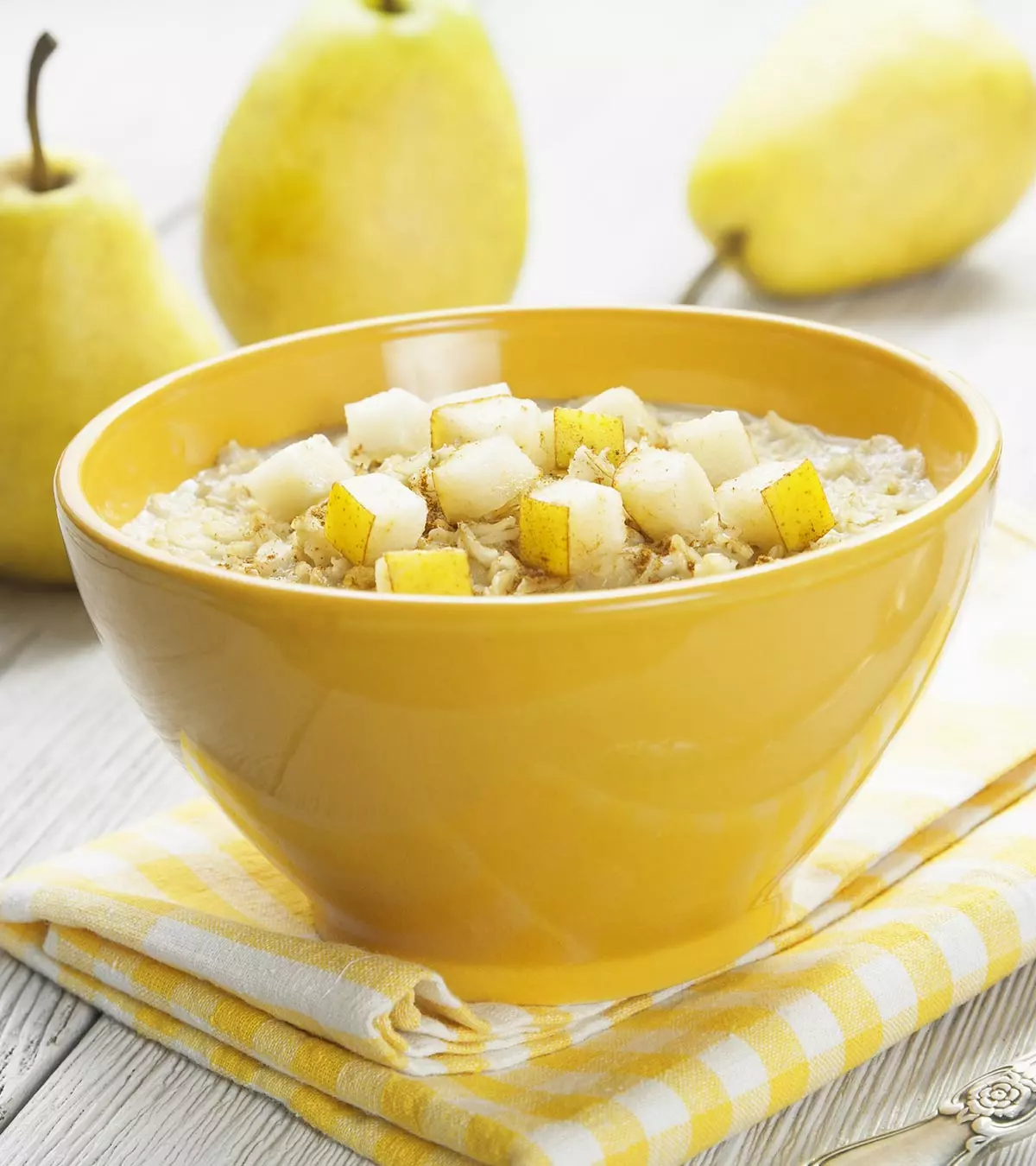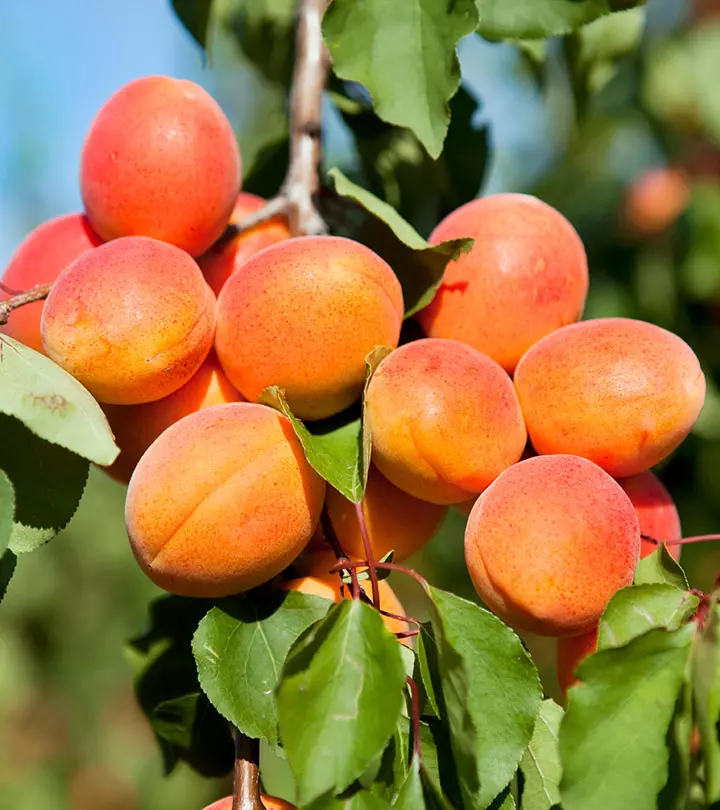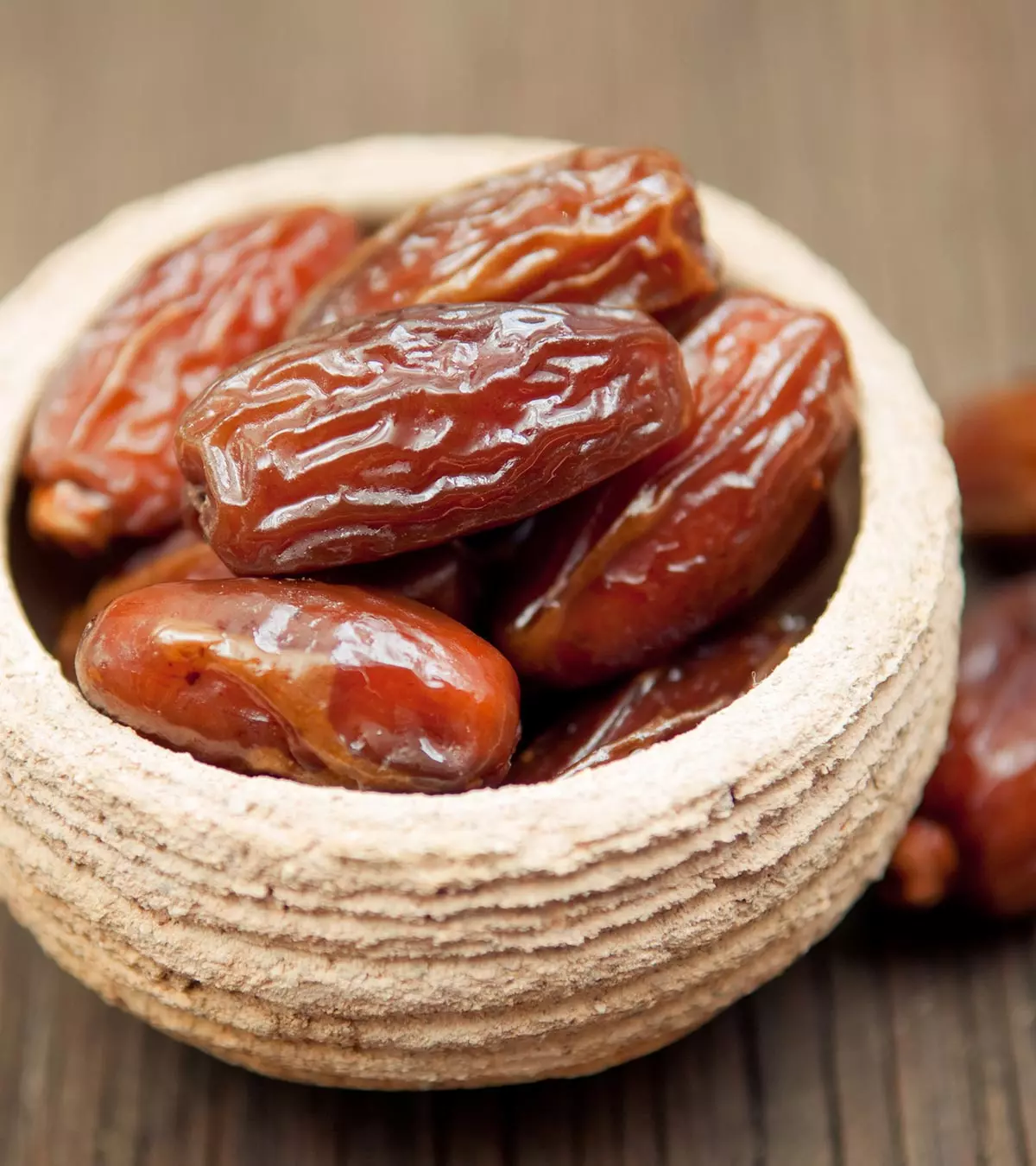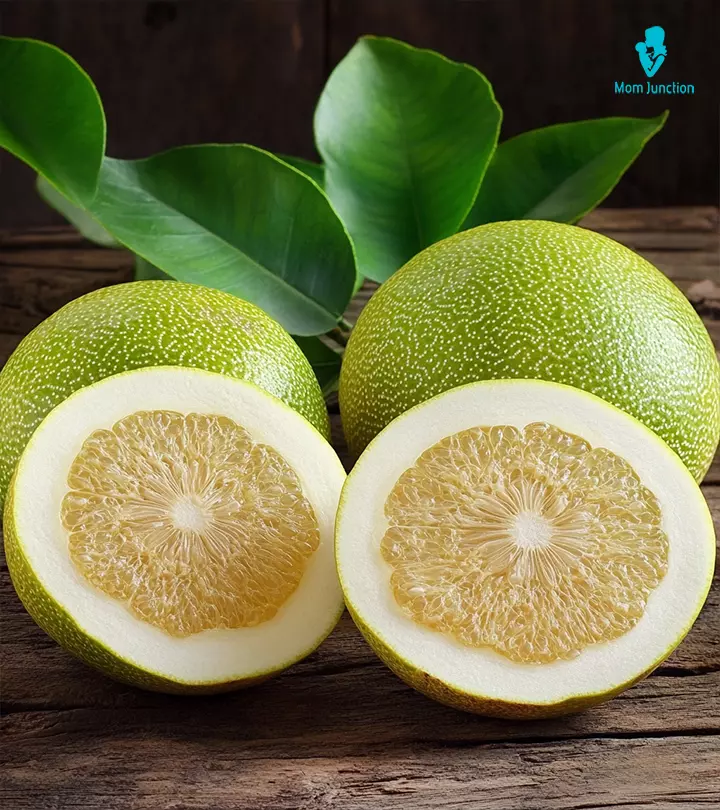
Image: Midjourney/ MomJunction Design Team
To ensure proper prenatal care, pregnant women are often advised to incorporate citrus fruits into their diet. Pomelo during pregnancy is one such fruit that offers various health benefits. The fruit tends to be sweeter than other citrus fruits and offers good nutritional value. In addition, it provides folic acid and vitamin C, which are essential for a healthy pregnancy. Read on to know more about pomelo and its pregnancy benefits and safety.

Key Pointers
- Pomelo consumption during pregnancy can benefit maternal health, as it is high in folic acid and vitamin C.
- Pomelo is a good source of fiber, potassium, and calcium, as well as antioxidants.
- Moderately consuming fresh and well-cleaned pomelo is considered safe during pregnancy.
- It is recommended to consult a doctor before consuming pomelo during pregnancy, especially when taking certain medications or experiencing certain health conditions.
What Is Pomelo?
Pomelo is a citrus fruit. Native to Southeast Asian countries, pomelo is now available in most parts of the world. The pomelo is slightly larger than a grapefruit, and the flesh is white, yellow, pink or red. The skin of the fruit is green or yellow, and the fruit is sweet and tart in taste . The white variety is milder in taste than the pink pomelo fruit (1).
It is one of the lesser known citrus fruits. But regarding nutrition, it packs all the punch of its citrus cousins like oranges, grapefruits, and tangerines. Pomelo is also known as Chinese grapefruit.
Nutritional Value Per 100gm Of Pomelo
| Nutrient | Amount |
|---|---|
| Water | 89.1g |
| Energy | 38kcal |
| Protein | 0.76g |
| Total lipid (fat) | 0.04g |
| Carbohydrate | 9.62g |
| Fiber | 1g |
| Calcium | 4mg |
| Iron | 0.11mg |
| Magnesium | 6mg |
| Phosphorus | 17mg |
| Potassium | 216mg |
| Sodium | 1mg |
| Zinc | 0.08mg |
| Vitamin C | 61mg |
| Vitamin B1 (Thiamin) | 0.034mg |
| Vitamin B2 (Riboflavin) | 0.027mg |
| Vitamin B3 (Niacin) | 0.22mg |
| Vitamin B6 | 0.036mg |
Source: U.S. Department of Agriculture (12)
Health Benefits Of Pomelo During Pregnancy
All citrus fruits contain almost the same nutrients with varying differences in their % DV (daily value). So, you can reap similar benefits if you eat an orange, a grapefruit or a pomelo. One example of the difference in their nutrient components can be the antioxidant compounds found in different varieties of citrus fruits. Here are some health benefits of the pomelo fruit during pregnancy:
- All citrus fruits including pomelo are good sources of folic acid. A lack of folic acid during pregnancy may hamper proper fetal development, leading to fetal birth defects.
- Pomelo might be one of the many other best fruits to eat during pregnancy as it is a great source of vitamin C. Pregnant women need at least 85mg of this essential nutrient every day (2). Consuming fresh pomelo fruit or its juice is a great way to fulfill your vitamin C requirement during pregnancy. It can also add variety to your citrus food sources during your pregnancy. Vitamin C also protects from cold infections and strengthens the immune system. Since it is an antioxidant, vitamin C also protects your cells.

- Pomelo is also a good source of other antioxidants such lycopeneiPrimary pigments present in fruits like tomatoes and pink grapefruit, and have antioxidants that may delay aging found in its pink/red varieties (3).
- Pomelo is also a good source of fiber and aids digestion. Regular consumption of pomelo and other citrus fruits can provide you with healthy fiber and hence relief from common pregnancy problems such as constipation (4).
- Pomelo is a good source of potassium and calcium. Potassium keeps your muscles and nerves healthy. It also helps to keep your blood pressure normal (5). You can also eat pomelo to fulfill your body’s growing calcium requirement during your pregnancy.
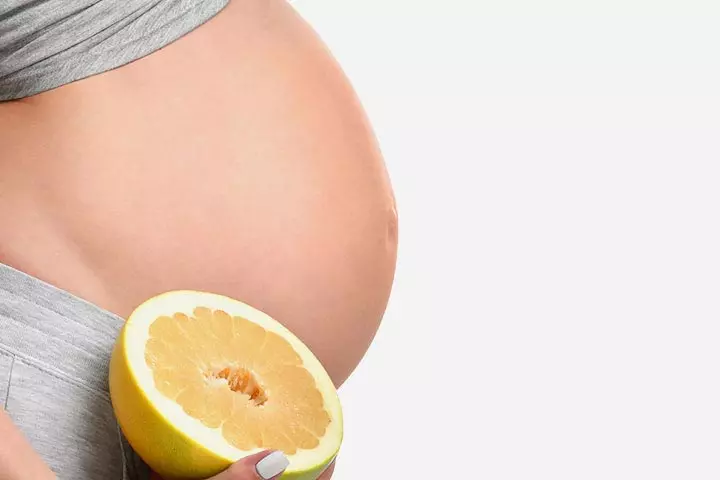
 Quick tip
Quick tipIs It Safe To Eat Pomelo During Pregnancy?
Eating pomelo and other citrus fruits during pregnancy is considered safe
. However, there are some concerns with citrus fruit consumption that you must discuss with your doctor (6)(7).
- Vitamin C in more than recommended doses may cause certain side effects such as diarrhea and kidney stonesiTiny crystals found in the kidney characterized by pain in the back and abdomen and during urination . If, during your pregnancy, you notice side effects such as nausea, stomach cramps, and heartburn after consuming foods rich in vitamin C such as pomelo then share your concerns with your doctor. Excessive vitamin C consumption can also harm the fetus. It is a water-soluble vitamin, which means your body doesn’t store excess amounts of vitamin C. But if you notice any side effects during your pregnancy as mentioned above, take proper care to consult your doctor about it .

- Certain active ingredients found in pomelo and other citrus fruits such as grapefruit may interact with drugs for cancer and heart conditions. One example is furanocoumarins found in pomelo (8). Discuss with your doctor about consuming citrus fruits during pregnancy if you are under treatment for any of these conditions.
 Did you know?
Did you know?- Avoid eating pomelo as a dried fruit as it will contain more calories and sugar content which is not advisable to prevent gestational DiabetesiA form of diabetes that develops during pregnancy when blood glucose levels are elevated, typically between 24-28 weeks . Fresh whole fruits should always be your first preference.
- Dr. Naheed Ali, MD, Ph.D., a physician and medical writer from North Miami Beach, Florida, says, “Pomelo should be carefully washed before eating, as it could contain bacteria or other diseases that could make you sick. Pomelos should also be consumed in moderation because overeating citrus fruit can cause heartburn and other digestive problems, which are frequent during pregnancy.”
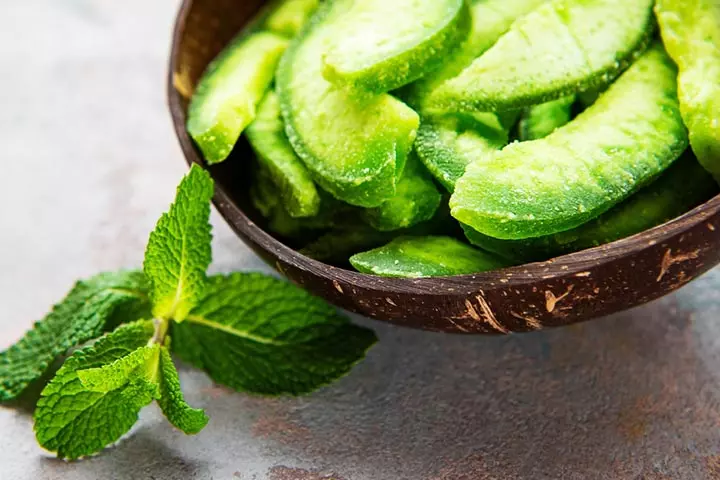
How To Incorporate Pomelo Into Your Diet
Below are some suggestions for including pomelo in your pregnancy diet.
- Add it to salads for a citrusy crunch
- Mix it into smoothies for a vitamin C boost
- Top breakfast foods like waffles or oatmeal with pomelo segments
- Use the juice to make healthy summer popsicles
- Include pomelo in fruit-based desserts for natural sweetness
- Toss pomelo segments into a fruit salad
- Use pomelo zest in baked goods for a subtle citrus flavor
- Use in salsas or chutneys as a tangy condiment
Frequently Asked Questions
1. When is the best time to eat pomelo?
Pomelo can be had anytime during the day. Research indicates that having a pomelo can help keep your blood pressure in check and prevent hypertension (9).
2. Is pomelo good for fertility?
Pomelo contains high levels of Vitamin C, which is known to enhance the immunity system and improve fertility level (10). It also contains Vitamin B12, which is known to further improve fertility in women (11).
3. Are pomelos high in sugar? Is it good for gestational diabetes ?
A 100g pomelo contains 0.76g of protein, 9.62g of carbohydrates, 1g of dietary fiber, and 6mg magnesium(12). Its high level of fiber keeps you full for a longer period. It contains 216mg potassium, which helps maintain fluid balance and regulates blood pressure.
It has a glycemic index (GI) of 72–78 but its glycemic load (GL) is low at 4.23 per 3.5 oz serving. The low GL makes it a diabetic friendly fruit.
4. Can pomelo help with morning sickness?
While some people suggest that sniffing the skin of a pomelo might help with nausea, there is no scientific evidence to support this claim specifically for morning sickness during pregnancy. While some women might find the scent of citrus fruits like pomelo soothing, others might find it unpleasant or triggering.
Pomelo is a nutritious citrus fruit that offers several vital nutrients, such as vitamin C, potassium, calcium, and antioxidants, which can promote your overall health. Its high fiber content can also aid in digestion. Expecting mothers can safely consume moderate amounts of pomelo during pregnancy. Pomelo can be consumed as is or used to make delectable and nutritious beverages, such as pomelo juice and smoothies. It can be one of the nutrient-rich and healthy juices to drink during pregnancy. However, opt for fresh pomelos instead of consuming dried ones since it contains more sugar and calories.
Infographic: Benefits Of Having Pomelo During Pregnancy
Even though pomelo is a lesser-known citrus fruit, it is nutrient-dense. The vitamins and folic acid essential during pregnancy are abundant in this fruit. Read this infographic to learn more about the benefits of pomelo and why you should have it during pregnancy.
Some thing wrong with infographic shortcode. please verify shortcode syntaxIllustration: Amazing Health Benefits Of Pomelo During Pregnancy
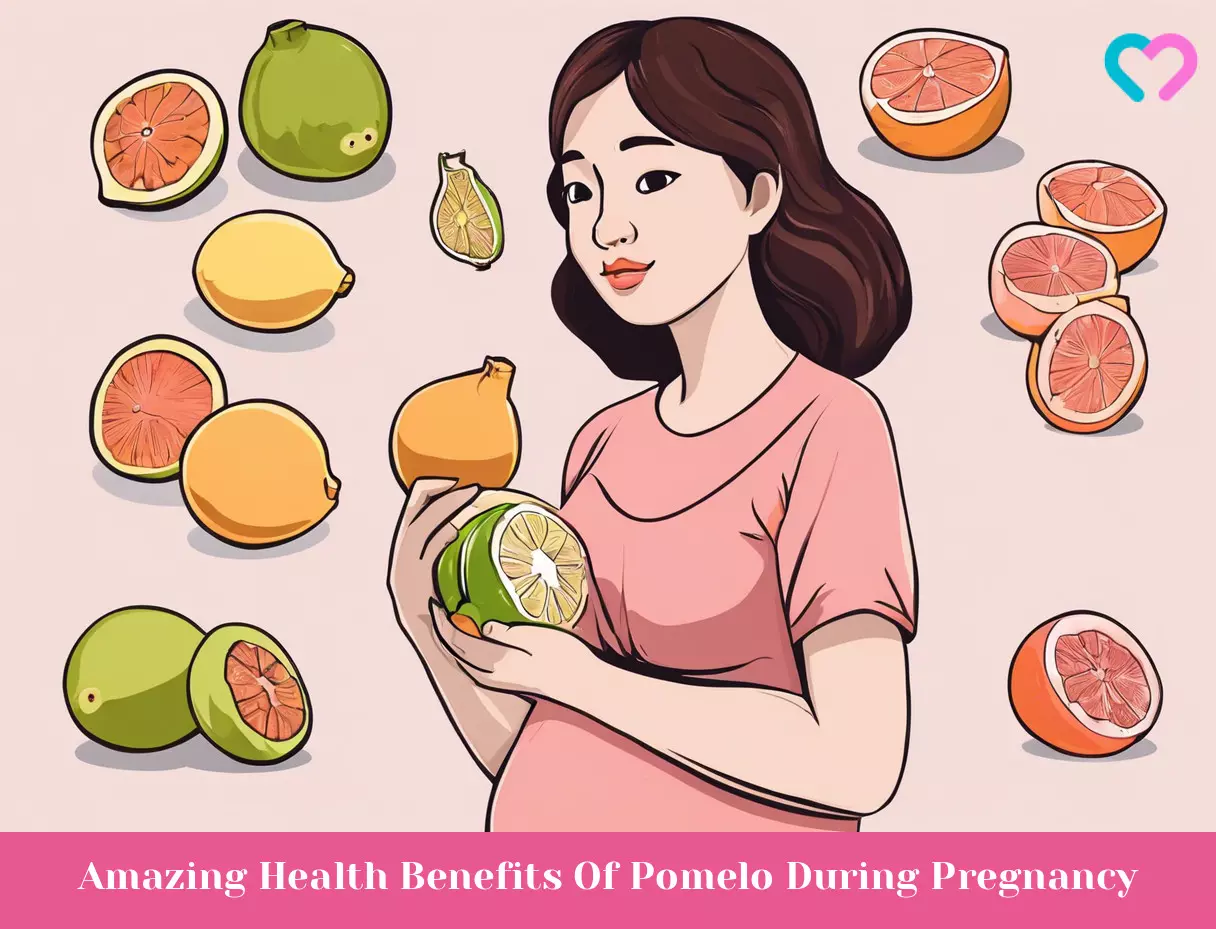
Image: Stable Diffusion/MomJunction Design Team
References
- Mun Wai Cheong et al.; (2012); Chemical composition and sensory profile of pomelo (Citrus grandis (L.) Osbeck) juice.
https://pubmed.ncbi.nlm.nih.gov/22980835/ - Vitamin C.
https://medlineplus.gov/ency/article/002404.htm - Vitamin C.
https://ods.od.nih.gov/factsheets/VitaminC-HealthProfessional/ - Constipation.
https://www.nhs.uk/conditions/constipation/ - Potassium.
https://medlineplus.gov/potassium.html - Vitamin C.
https://hsph.harvard.edu/department/nutrition/ - Ak Klemmensen et al.; (2009); Intake of vitamin C and E in pregnancy and risk of pre-eclampsia: prospective study among 57 346 women.
https://pubmed.ncbi.nlm.nih.gov/19522799/ - David G. Bailey et al.; (2013); Grapefruit–medication interactions: Forbidden fruit or avoidable consequences?.
https://www.ncbi.nlm.nih.gov/pmc/articles/PMC3589309/ - Anna Czech, et.al; Mineral Content of the Pulp and Peel of Various Citrus Fruit Cultivars.
https://www.ncbi.nlm.nih.gov/pmc/articles/PMC6944645/
- I Crha, et.al.; Ascorbic acid and infertility treatment.
https://pubmed.ncbi.nlm.nih.gov/12884545/ - Riccardo Gambioli, et. al.; Myo-Inositol as a Key Supporter of Fertility and Physiological Gestation.
https://pubmed.ncbi.nlm.nih.gov/34070701/ - Pummelo, raw.
https://fdc.nal.usda.gov/fdc-app.html#/food-details/167754/nutrients
Community Experiences
Join the conversation and become a part of our nurturing community! Share your stories, experiences, and insights to connect with fellow parents.
Read full bio of Shivani Sikri
- Dr. Naheed Ali has 18 years of experience in Holistic Health. He holds a Clinical Research Certification from The National Institutes of Health and a Lifestyle Medicine and Nutrition Certification from Harvard University.
 Dr. Naheed Ali has 18 years of experience in Holistic Health. He holds a Clinical Research Certification from The National Institutes of Health and a Lifestyle Medicine and Nutrition Certification from Harvard University.
Dr. Naheed Ali has 18 years of experience in Holistic Health. He holds a Clinical Research Certification from The National Institutes of Health and a Lifestyle Medicine and Nutrition Certification from Harvard University.
Read full bio of Ria Saha
Read full bio of Swati Patwal
Read full bio of Lorraine Teron







